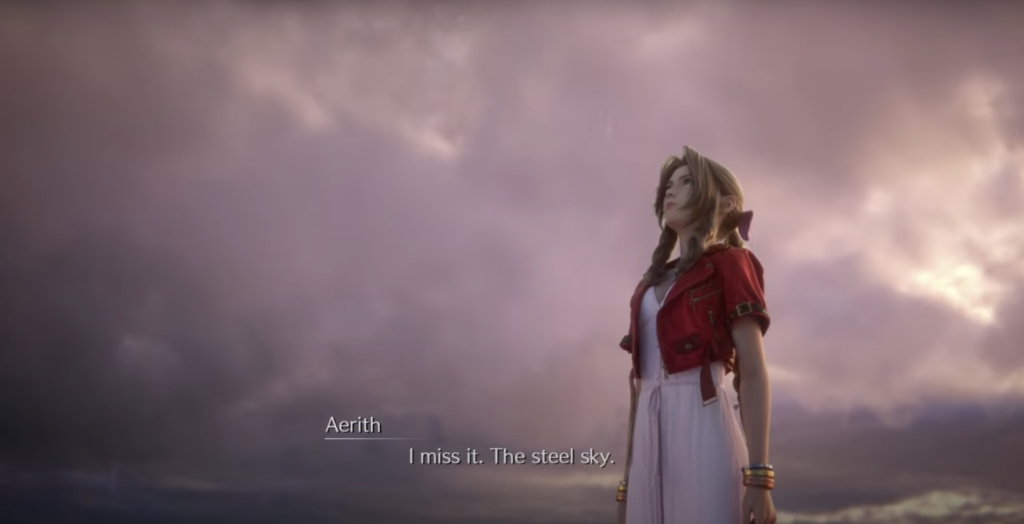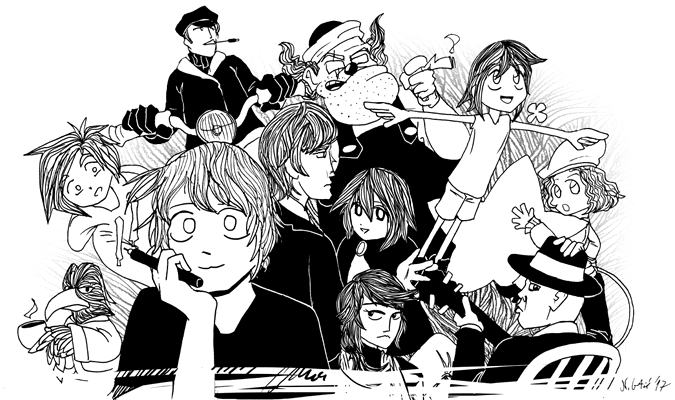Final Fantasy VII is my most favourite game of all time. When this long-awaited remake was (inevitably) announced, like everybody else I kept myself at a clinical distance because most of my best FFVII memories would frequently get marred by the multitude of spinoffs: It’s been a long time since I’ve seen Advent Children and I never sat down to properly play Crisis Core or Dirge of Cerberus, but the notion from the fans alone was that any expansion or further reframing of FFVII would just not feel the same.
Then how astounded I was when they put out their first live gameplay trailer.
Pictured: Assymetrical goodness.
The looks and realistic depictions of the characters I thought looked amazing and completely faithful. I always liked the original game’s upfront cartoonishness, vibrant primary palettes and the abstract polygons they’d use for their visual style, and it was a real joy to see that Cloud’s hair on the thumbnail stuck to those triangual strands as it did in the original. In Advent Children I’d moan that Cloud’s hair had this weird mohawk shape in a vague push towards realism. This was part of the reason, this distancing from the past game, almost as if they’re embarrassed by its childishness, what made Advent Children feel somewhat alienating as a sequel to the same story. And not just Cloud, but basically everybody looked a lot different and wore different outfits, and since this was the first time we ever saw these characters in realistic videos and fully voiced, it was hard to make a palpable connection with them.

Pictured: Not assymetrical goodness!
The immediate thing this trailer spoke to me, along with its character designs and its immediate commitment to show the meeting with Aerith scene, was that it wanted to revitalise and celebrate the colourful impressions of the original: Aerith and Cloud are two gentle souls lost in a huge city, Barret is loudly fighting for the ideals he believes in, and Sephiroth is an enemy Cloud still has a beef with. And we got a small look into the way fights account for in the game: As I expected, it would adopt a more active action battle system like the kind in the astronomically popular Kingdom Hearts and the franchise spinoff Crisis Core, which I thought was super fitting. The head-on battles where you controlled your every weapon swing and could use spells and abilities on the fly was long on my checklist for my ultimate dream games, and it got me giddy that the VII Remake would be the one to employ it.
That trailer earned my trust! It turns out that with each subsequent trailer Square would release they’d get my trust even more, until the fateful day came when the game released to everyone and I heard the first rumours that something different was going on in the story. Sadly I couldn’t, and didn’t play the game: I don’t have a PS4, and I want to wait for the PC port. But the spoilers were immediately a cause for concern, so I had to resort to Let’s Plays and take in the whole experience because as a fan I felt compelled to be a part of the conversation. It was a lucky break to check out Dan Floyd’s extensive playthrough – a figure I admire for his work as host in Extra Credits and as an animation expert, and also a self-professed fan of FFVII. As another fan who loves animation and loves EC, Floyd was the perfect avatar with the sweetest charm through which to experience the game, and the playthrough would continue for many weeks.
Following this I just want to dish out a ton of unorganised, unmitigated impressions about separate game elements, such as characters, locations, combat and story points, before tackling the ending, which has a great deal to talk about and completely reframes everything I have come to expect from FFVII. Let’s go with characters first.
Characters
So Cloud Strife: There’s a lot of joking and lazy speculation that Cloud’s this whiny emo hero because Advent Children really didn’t do justice to this character, but in the original game Cloud early in the story was quite peppy and honestly a bit of a jokester. If you wanted to be generous you could say Cloud was on the whole emotionally neutral and rational sufficiently so that any players with any temperament or emotional background could find something to relate to in Cloud – he was at once a little impatient, and a little caring, a little aloof and a little contemplative. The original game did an impressive job juggling all these traits, but the remake banks a lot on Cloud’s professionalism and dedication to his former SOLDIER rank. He’s a serious man doing serious business and though it makes him a little more unscrupulous in the remake than what I’d like, I was really surprised how much I like this no-frills Cloud that threatens to cut down snitches without a second thought(poor Johnny). He shares a lot of war stories and there’s a greater emphasis that working with the Shinra messed him up in some way, and it was a great way to pump out some personal tragedy and weight to Cloud’s character in the new game. And yet also – he is not above doing absolutely ridiculous things, such as picking flowers or dancing at the Honey Bee Inn, although it does take a little more to convince him. He rarely laughs as much as he did in the original, and it takes him forever to do a simple high-five. While in the remake Cloud would trash talk back to Don Corneo while in his disguise, in the original Cloud would try his best to play along and imitate a girls voice, and I kinda miss that a bit.
Barret actually has some character and he’s much less of a walking caricature(though he still is one) and a real joy to listen to. His design is wonderful both with and without those Wesley Snipes glasses, and throughout the game really takes his position as AVALANCHE leader strong and seriously, especially in the climactic moments in the Shinra HQ. Barret is the one who pulls out President Shinra from falling off and makes an incredible callout speech, and it is in these moments when the game understandably, and with great results, lets Barret to shine. Wouldn’t we all like to torture the world’s richest like that.
Tifa’s fantastic, on the gameplay side of things is one of the most fun characters to play as(while in the original she was infamously weak). Her apparel is a small bit different, with her leather dress coming in combined flaps and those thigh-high black stockings to appeal to otaku sensibilities, and I think they’re nice. Contrary to what fans say, her boobs are just fine, and are honestly enormous in-game, just at the limit of being believable on a human being(wouldn’t stop fans from making a PC mod that makes them even bigger though). However, as fleshed out as Tifa is, I think she suffers a little from a lack of decent characterisation in the remake, and is showed way too much as a woman that carries very little agency. It’s nice that she has a pronounced inner turmoil over working for AVALANCHE and that she does valuable business for Sector 7 denizens, but so much of her personal desires and stakes are pushed to the sidelines: We see her Sephiroth flashback in Nibelhiem about three times in the remake but not once did Tifa react with complete rage and viciousness whenever she’d see Sephiroth, despite having as much of a score to settle with him as Cloud. It’s completely unfair. And there’s also that Tifa wasn’t too pushy in redescovering her relationship to Cloud in childhood, which was an important part of the original game, but was believable because the story was moving at a break-neck pace. In here in spite of a lot of story expansion and padding, there was never a sound moment where Cloud and Tifa really deeply talked about their past, though it would have sounded as a nice fit.

“Is this the man who murdered my dad, cut down my martial arts teacher and burnt my entire hometown? I’m not angry about this at all!”
Aerith has been venerated as this saintly figure and a pure maiden that needs saving in popular culture and the VII spinoffs, but in the remake we really get the sense of the mischevious cheekishness she’s always had. She even said a cuss, once! Aerith calls out everyone and everything in the remake with such humour and gusto. Not even in the original was she this cheeky, but she was a woman aimed at more practical sights, such as making money, figuring out some really novel ways to enter closed off buildings, and yet having a smoothness of confidence and taste to pick her own dresses. And an incredible courage and commitment. Remake Aerith does all these things too but I think at a smaller intensity, more made aparent with her babyish face and innocent childlike demeanor. I’ve heard there’s been some controversy that Japan thought Aerith didn’t look babyish enough, which I found perplexing, because Aerith had this air of an old and wizened figure in the original game. Canonically, she was a year older than Cloud, and was a character with an enormous amount of patience and a talent for long-term thinking, keeping her eyes on high-minded goals. I missed a little of that slow-thinking, wise Aerith in this game, but what she lost in there she gained in her majestic, larger-than-life messianic mission to deviate from the game’s original timeline and push bravely towards a wild unknown. Aerith from the start of the game is a facade which she throws off by the end to reveal a character more older and wiser than anyone can possibly comprehend, and while I love this swtich, I can’t help but feel that the transition to it has been maybe to sudden and without precedence to make sense.
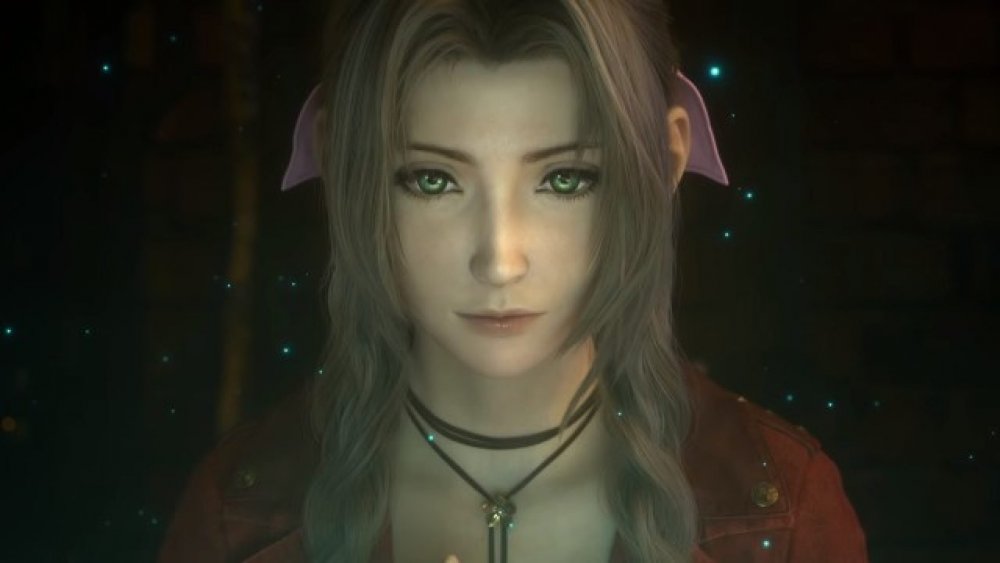
The intro really got Aerith’s world-weary and messianic traits well.
Her attacks are amazing too. Though I’ll miss hearing the loud KLONK when she hits enemies with her staff, I do like the ranged pixie dust attack she throws, as well as all the creative support-class abilities that go with her.
Biggs, Wedge and Jessie all had a big facelift and it’s been great to spend time with these characters more. I love the ‘bro’ chatter of Cloud and Wedge. Biggs has been the most mysterious one, having a lot of history and operating stuff the background, like organising people, helping poor people who are financially struggling and stuff, but otherwise not really directing much attention to himself. A lot of what he does is left to useful speculation.
Jessie has been by far the biggest delight. She’s made into this lively person with a secret life and aspirations towards acting, and is the crux of an entire side mission which thankfully takes you deeper into the upper plate of Midgar to serve as more foundational worldbuilding. She’s also uncontrolably sassy, with fans joking about her thirst and delivers so many innuendos while also being a step in front of any potential shippers. She knows she has the upper hand(“There is such a thing as playing too hard to get”). Of course in line with the original game, Jessie had to die, and Square mercilessly had to pound both fans and newcomers in a brutal display of drama and comeuppance. Jessie’s sendoff was a brilliant and emotional scene(if you ignore how “pizza” is such a recurring punchline for all of the characters, Midgar just loves its pizza), and it’d make me look forward to other tragic farewells in the sequels if only they weren’t an absolutely downer and a painful thing to go through(And we all know VII is famous for that!).

Jessie, please, the kids are watching.
The side characters also offer a lot of depth to the world. Skotch and Kotch are funny as showmen, and I just love the opportunity of having a colosseum at Wall Market. My favourite new character is Leslie, who was apparently quite anchored in FFVII’s expanded universe, and he seems like a very determined, down-to-Earth guy who just wants to look for his girl back. The three “judges” of Wall Market are also fascinating personalities with Andrea replacing all the negative gay stereotyping from the original game(though I’m certain we’ll see Murki again in Costa del Sol), and peppering Honey Bee Inn with lots of good vibes and vanilla flavour, though I also miss its seedy brothel nature from the original. Chadley is also nice, being fundamentally entwined with the gameplay mechanics of the game more than any other character, and with a robotic backstory to appropriately reflect it.
The Shinra villains are all so accurately protrayed it’s uncomfortable. Heidegger is a hog with the same horse laugh and Scarlett is a pragmatic vixen with little regard for human life. And Hojo’s just plain disgusting. I never expected the game to go just all-out on showing the snake-like sliminess of Hojo, but Square have really outdone themselves when he was getting off while talking to Aerith about how much he loves and licks the organs of her dead mom. Hojo’s a perfect villain you just love to hate.

“And we’ll rule over fleas, my dear, thousands of fleeeeeeaaas!”
As much as I love Rufus in this remake(hard to blow up a pretty boy who plays with his coins), there’s a slight disappointment that I invested too much of my fantasies of dreaming he’s gonna look like Leonardo DiCaprio. It’s funny, I know. Think about it, FFVII came out in 1997, right about the time of Romeo + Juliet and Titanic and when the young 90s Leo DiCaprio took the hearts of people with his adorable blonde bangs full of raw edge. While Rufus kinda plays into it, there’s these tiny little things that get me: His hair is way too bleached, and is paler than even Cloud’s hair. In the original it had a more orangey hue, and it also has a lot less volume in the remake. This is just nitpicking, Rufus is awesome, I just wish he was like – literally Leonardo DiCaprio, haha. But I guess he’s gotta have a deeper voice and be gruffer if he’s going to take after his pops. “You can’t have a spoiled 90s grunge-era brat who hates his parents and listens to Nirvana be a CEO of a global life-sucking company” I guess was the logic the developers had, though that still doesn’t explain oddities like Elon Musk running the richest companies today.


A girl can dream. *sigh*
Roche is a beast. I love him and that is all. He will reappear and will probably have a tragic death.
Locations
Midgar looks absolutely beautiful in both the above and under-plate, and while I’m glad there are sidequests that take you more on the upper plate, I still think that the lack of proper gameplay sequences on the upper plate is a gargantuan missed opportunity. The upper plate city is such an iconic element present in all of FFVII promotion material, and you’re telling me that not once(even in the original game), you get to actually spend a considerable amount of time in the city, visisitng the establishments, mingling with the people, just to absorb what kind of place it is? I love the slums and they’re obviously such an important story element but I feel like there’s too much of them. But also you never getting to see the plate may be the point the game was trying to make, if you want to be cheeky. How the upper plate’s this wonderful world for the super rich and privileged, and you’re being made to feel that same frustration of living in the underworld and never knowing the kind of luxury the people on the plate have. I’d still love for an open world scenario to allow for a visit to Midgar, like a Grand Theft Auto game set in Midgar. I’d play the heck out of that. And I loved the eternal night vibe of it that got a cyberpunk or Gotham quality to it, like a shady place where there is never daylight, only in the original it was believable that it’s because of air pollution. Sadly this is another childish headcanon I had that was broken, and it felt a little lame that there was daylight in Midgar, even as reaching the slums, instead of a constant magic of a humming, neon-green glow.
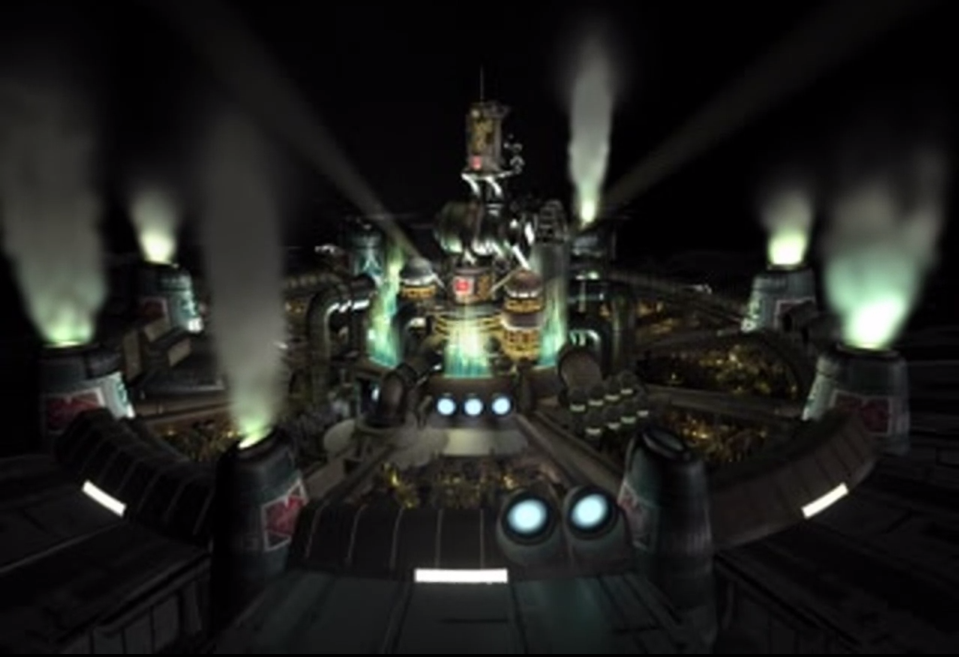

“We don’t know who struck first, us or them, but we know that it was us that scorched the sky.“
This isn’t to berate the other locales in Midgar which are so well-made and believable, and has a sufficient kind of branching that’s enough to feel non-linear(I’m aware that people are complaining modern FFs are very linear but I’m of the honest opinion that all FF games were kind of linear and railroad-y). Wall Market is wonderful and so is Shinra HQ with its wee hours dim and quiet enough to make more sense to make its infiltration a covert operation. I’m very saddened that Shinra HQ doesn’t have any of the minigames it had in the original(like sneaking missions, the search for Mayor’s password, vent-climbing), and replaced them instead with a very tedious gauntlet inside Hojo’s lab, but the core of it remains thankfully unchanged. At the very least I’m glad the stairs sequence is still there. There’s no way fans would forgive them if they left it out.
The climb to Shinra HQ on the other hand I think it’s a major improvement. Though I’ll kind of miss the car battery puzzles and Barret being called out for his “golden wire” analogy, I do think that action and enemies are an appropriate filler for the ascent, which feels so organic and is a reason to give a toast to the environmental artists, who not only have to make building rubble, but organised building rubble you can climb on. Definitely one of the parts of the game that has no business feeling this fulfilling, but it does.

Gameplay
There’s not a lot I can say about the gameplay cos I never played it but I loved everything that I saw from Dan’s let’s play. It seems deeply engaging and like it demands all of your mental faculties, knowing how to position yourself and dodge attacks while simultaneously keeping the juggling act of item and magic management. It looks like something that really takes a lot of practice, and while I’m one to shy way from hard games more often than not, for pure favourites like this I’m usually happy to try to go the extra level. The materia system is intact and that’s a big relief, and it offered some materia such as summons and Wind and Time early on which I always thought came in late in the original game. And there’s a bunch of new materia that all seem so cool, and the addition of weapons upgrades and weapon skills are such wonderful additions. It really makes the experience in FFVII that much more customisable on more fronts than just the materia setup, something you only felt in fragments while playing the original game. Gameplay is great, not much to add.
Story
Some new tiny bits of story that really flesh out the world were interesting sights, like the inclusion of the mascot, Stamp, and how it was a Shinra symbol that got co-opted by AVALANCHE. I love the early exposition of the Wutai War since it’s such an integral part of the world’s history, sort of parallel to WW2 in the 20th century and how it resulted in an economic boom for the victors. There’s also a disturbing insight into the process of making SOLDIERs such as Cloud, which is proved to be a dangerous business that causes chronic illness and cuts off the lifespan of people. This is something I’ve been afraid of learning since it means that my favourite hero in fiction will probably die young, but it is not entirely unexpected and it’s a story twist I would absolutely welcome. I’m just surprised that it has been revealed so callously and casualy, to just further reinforce the tragedy of how Cloud’s early demise was going to be apparent.
I love the inclusion of side-missions as I welcome any excuse to get to know the world more, like the whole deal of children growing a conscience and holding a club where they fix stuff around Sector 5, or the Angel of the Slums being this mysterious benefactor, and her daughter going about and spreading misinformation and propaganda to get the rise out of people. Some of the completely silly and overly long moments in the slums was really amusing, like the long and drawn-out chase of the Abzu Shoat in the sewers. It’s way too long and it obviously is going to be a low point for people replaying the game in the future, but it’s such a funny and absurd scene that I think it’s always gonna be something that’ll outweigh the monotony of it.
One thing I don’t get is why Cait Sith have to make an early cameo. It’s really felt uncalled for and unnecessary. It’s been established that this is a remake meant for fans, but it still rings hollow to include an early appearance of him, but I guess if they wanted to do a nod for veterans, it couldn’t be helped. And the plate falling scene isn’t really as mellodramatic and horrifying as it had been in the original, with the President looking from the distance with a decadent opera soundtrack. It was this jarring sound juxtaposition that made you realise what absolute monsters Shinra were at that point in the original game, but the elements just didn’t seem to be in play in the remake, and it’s kind of a bummer. I can understand sort of why they didn’t give it their all on this one, since it’s a segment that’s already been treaded in the original and – surprise, a lot of the people survived, but, it’s a missed opportunty.
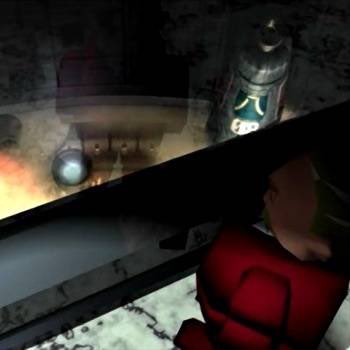
Something about this scene rang much better in the original.
The exposition at Shinra HQ about the Cetra was just the coolest! It’s wonderful to have a reconstruction of a time that’s happened long before the Gaia we know today, even if it may be much more decorated and romanticised than what the reality probably was in those days. A 2000-year gap would roughly made the Cetra at the same distance as the ancient Romans are to us today. Domino being an inside man in Shinra HQ that’s controlling the security systems for the sake of the team was also a really cool bit of story. Lastly I’m super glad there’s more opportunity for the main characters to interract with each other, such as Aerith and Tifa chatting instead of being competitive for Cloud’s affections, Barret being more involved with other characters in general instead of just cartoonishly reacting to outside influences, and it just gets me excited for the crew members coming in the future. There are some character dynamics in the game that I have no idea how they would play out because the VII cast is just so bizarre. What would Nanaki say to Cait Sith? How would Yuffie and Barret interact? It would make anyone giddy.
The ending
Well this is the one where all pretense goes out the window and we contend with the biggest elephant in the room: So the arbiters of fate that have been appearing in the remake were trying to keep the original continuity of Final Fantasy VII intact, making sure that the proper characters meet at appropriate times, and that characters sign to the fact that some must live and some must die. Of all the characters, Aerith and Sephiroth both seem to have been uniquely blessed with the insight of what’s going to happen in the future(in the “canonical” timeline) and are both aware of their fates. Since Sephiroth lost in the original game, this time he wants to twist fate to his own benefit, and Aerith similarly wants to curb his attempt and stop him, too.
After the party left Midgar and had a literal duel with the Arbiter of Fate and a premature face-off with Sephiroth(including his theme song, his Supernova ability, and the final omnislash showdown), it feels like Remake finally broke off from the railway it’s supposed to go on and now anything can happen. In an ironic twist, the train really did break off, contrary to an analogy Cloud always liked using in the original. The best way to think about the VII Remake is like a sequel that’s happening in a Universe B, where new developments and twists can happen based on the assumptions of Universe A. This is why I keep insisting that people have to play the original VII before the Remake, otherwise the entire plotline won’t make sense, and players will not know the severity of the stakes at play here.
There are new stories awaiting Cloud, Barrett, Tifa, Aerith and Red XIII, and as much as it makes me scared(any of them could now die), it also makes me very excited to know that there are more stories to be told with these beloved characters. And it’s what keeps me very optimistic for future games, because now the childhood story that I went through once is not over, and it’s coming to life again. Of course, there’s also a possibility that the story would take a turn for the sour(considering we’re dealing with Nomura’s and Nojima’s conceptions of story structure and dramatic tropes), and in case it does, there will still be the original Final Fantasy VII you can play. It’s like the original trilogy of Star Wars: It’s still there, it’s still perfect, even more perfect than before, but I sincerely hope the team knocks the Remake out of the park.
Jim Sterling wrote a video where he calls VII Remake a very bold(and arrogant) move where a famous video game, probably the most famous video game ever made, has an opportunity to confront its own legacy, and it does it in a way where it takes a good long look at it, with actual deliberation showing full the awareness that Square and its creators really care about the impact FFVII made on its fans and raised a generation of people. After all, you’ve already achieved perfection once, what’s there more to do? You can only ponder about it and celebrate the things it did, but you can also use this fame as a tool to fashion something more expressive. Remaking it would be capturing a shadow, instead of using the opportunity of reconstructing a brilliant piece into a new statement. It reminds me of how music bands often reinvent themselves when they feel they’ve come to a dead-end where they peaked, and when their popularity won’t allow breathing room for atrophy or disappointment. It’s why The Beatles made the radically cacophonous White Album after the imaginative and dreamy Sgt. Pepper. It’s why Radiohead made the existentially primal and anguished Kid A after OK Computer. And I’m thinking VII Remake, if done correctly, has the ability to provide something new and a commentary of its own that will continue the momentum of VII’s legacy. This could be Final Fantasy’s own Kid A.
The story implications also leave a lot of puzzles: Like the fact that the characters had a flashback to the end of VII original whereupon they say it was a ‘bad ending’ – i.e. humans did not survive the confrontation with Meteor, as was one of the popular ways to interpret VII’s ending. I always loved that VII’s ending was ambiguous and open to interpretation, but with the remake in tow, where does that leave the post-Meteor expanded universe? Where would Advent Children fall down? Was Advent Children the bad ending? Does the Remake universe mean to break from the Sephiroth cycle once and for all? Is Zack alive? If he is, why does Cloud have the Buster Sword? Will there be a Crisis-On-Infinite-Earths scenario where characters have to join forces cross-dimensionally, and Universe A Cloud meets Universe B Cloud? Will Cloud have to ally himself with Sephiroth so they could both fight fate? It’s a lot of questions we’ll have wait for a long time to answer, but it also makes me happy to make them since my favourite characters all have a stake once again and now feel truly alive. Many of these multiverse points were thoroughly discussed in EZA’s Spoiler Mode, where Maximilian Dood was offering his multi-layered explanation over what is going on in the VII Remake ending:
This Let’s Play has been amazing and I’m just waiting for all the parts to come out so I can get my hands on it myself. I also need to listen to its mammoth 7-CD soundtrack(and that’s just the first game!). VII Remake was the game of my wildest dreams and in an era of disappointing sequels and remakes it was a surge of endorphins that made me believe in VII once again. Even if the remake turns out to be a disappointment, it still signified that VII is just as good as I always thought it was, and gives it the greatest gift and luxury by intricately observing and studying its own legacy. But most of all the characters have knocked it out of the park and offer a completely new dimension, a completely new cheek I never knew they had, and it makes me feel like I’m getting to know them for the first time. Now I understand why Aerith feels so much older and hopelessly wiser. We’re going into a terrible unknown and I feel some of her hesitance as she bravely walks away from fate and laments that she will never bask in the comfortable and the familiar once again. No more steel skies.
